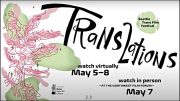New Reports Find Widespread Discrimination, Economic Vulnerably, and Health Disparities
WASHINGTON, D.C.— In a year when transgender Americans are experiencing unprecedented visibility in the State of the Union address, the media, and popular culture, while simultaneously suffering extreme violence, two new reports released recently detail the widespread discrimination and inequities the transgender population faces, particularly transgender women and transgender people of color. From high rates of poverty, harassment, violence, poor health, limited job opportunities, and isolation from their larger communities, transgender people are among the most vulnerable communities in the country.
The two reports, Understanding Issues Facing Transgender Americans and Paying an Unfair Price: The Financial Penalty for Being Transgender in America, are co-authored by the Movement Advancement Project (MAP), the Center for American Progress, the National Center for Transgender Equality (NCTE), and the Transgender Law Center, in partnership with Center for Community Change, Center for Popular Democracy, GLAAD, National Association of Social Workers, and the National Education Association. Understanding Issues Facing Transgender Americans is available at www.lgbtmap.org/understanding-issues-facing-transgender-americans and Paying an Unfair Price: The Financial Penalty for Being Transgender in America at www.lgbtmap.org/unfair-price-transgender. [pullquote]“Transgender people, especially transgender people of color, experience life-threatening situations, including violence, higher rates of HIV and AIDS, homelessness, and extreme poverty,” said Mara Keisling, executive director of the National Center for Transgender Equality. [/pullquote]
“Transgender Americans are experiencing a unique moment in history, as growing visibility leads to greater familiarity and understanding of transgender lives,” said Ineke Mushovic, executive director of MAP. “At the same time, many transgender people, particularly transgender women and transgender people of color, still face enormous barriers to their safety, health, and well-being.”
The two reports detail the myriad issues transgender Americans face. Paying an Unfair Price: The Financial Penalty for Being Transgender in America, paints a stark portrait of the economic insecurities that leave transgender people at high rates of unemployment and poverty. Transgender Americans face clear financial penalties simply because they are transgender and are left economically vulnerable because of two primary failures of law:
- Pervasive discrimination and a lack of legal protections mean that transgender people struggle to find work and safe housing, make less on the job, and have higher medical costs than their non-transgender peers.
- Failure to adequately protect transgender students means that transgender people and their families often face a hostile, unsafe, or unwelcoming school environments. Harassment, bullying, and violence make it difficult, if not impossible, for transgender students to obtain the skills and education they need to succeed. As a result, they are ill-prepared to compete for good jobs and see reduced earnings and fewer opportunities for successful jobs and careers.
“In some cases, employment discrimination, lower wages, and lack of legal protections make it harder for transgender people to cover basic necessities like rent, food, clothing, and healthcare, let alone save for the future,” said Kris Hayashi, executive director of the Transgender Law Center. “In other instances, legal inequalities mean that transgender people are forced to pay higher costs for needs like housing, healthcare, and education.” [pullquote]“In some cases, employment discrimination, lower wages, and lack of legal protections make it harder for transgender people to cover basic necessities like rent, food, clothing, and healthcare, let alone save for the future,” said Kris Hayashi, executive director of the Transgender Law Center.[/pullquote]
Understanding Issues Facing Transgender Americans provides a high-level introduction of the issues facing transgender Americans, including:
- Violence: According to the 2013 Hate Violence Report from the National Coalition of Anti-Violence Programs, transgender people were much more likely to experience threats, intimidation, harassment, discrimination, and sexual violence than non-transgender people. The report found that transgender women and transgender people of color are much more vulnerable to violence, especially at the hands of law enforcement. In 2013, more than half of all LGBT homicide victims were transgender women of color.
- Suicide Risk: 41% of respondents to the National Transgender Discrimination Survey reported having attempting suicide at some point in their lives. This compares to 1.6% of all Americans who have reported attempting suicide. Respondents who were bullied, harassed, assaulted, or expelled because they were transgender or gender non-conforming in school reported elevated levels of suicide attempts (51%).
- Homelessness and Discrimination in Housing: One in five transgender people has experienced homelessness at some time in their lives because of discrimination or family rejection. Transgender people facing homelessness also face discrimination from agencies that should be helping them, with nearly one in three (29%) reporting being turned away from a shelter. One in five transgender people (19%) in the United States has been refused a home or apartment, and more than one in ten (11%) have been evicted, because of their gender identity.
- Health: Unequal access to healthcare and discriminatory healthcare exclusions deny transgender people coverage for medically necessary care, including hormone therapy, counselling, and other transition-related care. Even when transgender people have full health insurance coverage, however, they often face discrimination by health care providers.
- HIV/AIDS: Transgender people, specifically transgender women of color, are at heightened risk for HIV. Estimates are that one in four black transgender people in the United States is living with HIV/AIDS. Discrimination, stigma, social isolation, bias among health and social service providers, and a lack of targeted prevention efforts have all contributed to these high levels of infection.
- Discrimination in Public Accommodations: In a 2014 study conducted in Massachusetts, 65% of transgender people reported experiencing discrimination in a place of public accommodation in the past 12 months. The study revealed that bathrooms in restaurants, libraries, cinemas, shopping malls, airports, and other places open to the public were locations of frequent, sometimes serious harassment and abuse of transgender people. Only 17 states and the District of Columbia prohibit discrimination in public accommodations on the basis of gender identity, covering 36% of Americans.
- Identity Documents: Official identity documents, particularly drivers’ licenses, birth certificates, social security numbers, and passports, that do not match with a transgender person’s gender presentation can obstruct employment and travel, as well as expose transgender people to harassment, violence, refusal of service, job loss, and more.
“Transgender people, especially transgender people of color, experience life-threatening situations, including violence, higher rates of HIV and AIDS, homelessness, and extreme poverty,” said Mara Keisling, executive director of the National Center for Transgender Equality. “There is an urgent need for protections so transgender people can live safe, healthy, and thriving lives.”
Paying an Unfair Price: The Financial Penalty for Being Transgender in America is a companion to the recently released report, Paying an Unfair Price: The Financial Penalty for Being LGBT in America, available at http://lgbtmap.org/unfair-price.
[From a News Release]








